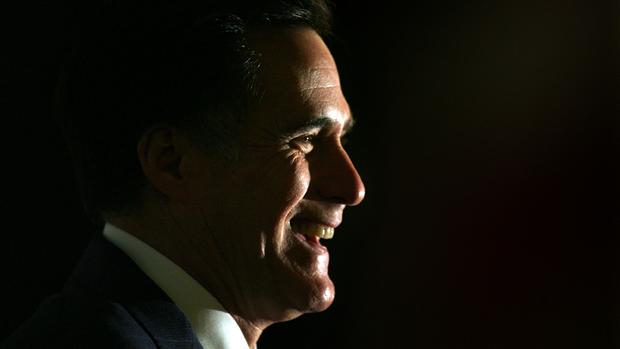Mitt Romney introduces "business plan" for the economy
Presenting what he called "a business plan for the American economy," Republican presidential candidate Mitt Romney on Tuesday laid out the 10 actions he'd take to revive economic growth on his first day as president.
"The world has changed," Romney said during a campaign stop in Las Vegas. "So our economic strategy has to be brought up to date."
The 10 immediate actions Romney laid out today are part of his new economic plan, which consists of 59 proposals largely familiar to GOP audiences. They include eliminating the capital gains tax for "middle-income" taxpayers and instituting other tax reforms, scaling back regulations, standing against union interests and expanding domestic energy production.
The former Massachusetts governor made a point of showing his Nevada audience that he was not using a teleprompter but just written notes on his plan in order to have a true "conversation" about the economy. To illustrate the way the world has changed, Romney used the example of the growing use of smartphones in place of payphones.
Speaking just days ahead of President Obama's planned economic address before a joint session of Congress, Romney said the president doesn't understand the new economy.
"President Obama's strategy is a payphone strategy, and we're in a smartphone world," he said. "What he's doing is stuffing quarters into the payphone and wondering why it's not working -- It's not connected, Mr. President."
CBSNews.com special report: Campaign 2012
The plan the president will lay out on Thursday will amount to "another stimulus and more quarters" which won't put America back to work, Romney said.
The GOP candidate said that his plan could grow the economy at a rate of 4 percent a year and add 11.5 million new jobs for Americans within four years.
On his first day in office, Romney said he'd submit five bills to Congress and sign five executive orders, including one bill to reduce the corporate income tax rate to 25 percent. He'd also introduce a measure to implement the free trade agreements with Colombia, Panama, and South Korea -- agreements Mr. Obama has also asked Congress to act on.
"For high-productivity nations it's good to have trade, as long as the nations we trade with play by the rules," Romney said, calling China a "currency manipulator."
One of his executive orders would officially dub China a currency manipulator and sanction the country if it did not quickly move to float its currency.
Romney's third bill would facilitate broader domestic energy production. He'd sign a corresponding executive order to streamline the issuance of drilling permits to boost energy production.
His fourth bill would consolidate job retraining programs. His final bill would immediately cut non-security discretionary spending by 5 percent.
Two executive orders would take on regulatory actions implemented by the Obama administration. The first would roll back the "Obamacare" health care law. According to a fact sheet from the Romney campaign, it would direct federal officials to "return the maximum possible authority to the states to innovate and design health care solutions that work best for them."
Another executive order would direct agencies to eliminate all Obama-era regulations that "unduly burden" the economy. His last order would reverse executive orders signed by Mr. Obama that "tilt the playing field" in favor of organized labor.
"We have to recognize our nation is in competition with other nations around the world," Romney said.
Romney's speech drew criticism from both his GOP and Democratic opponents. Ben LaBolt of the Obama re-election campaign said Romney "offered a plan that would tip the scales against hard-working Americans."
Former Utah Gov. Jon Huntsman, another GOP presidential candidate, argued today that Romney had a failed economic record as governor. Mark Miner, a spokesperson for Texas governor and 2012 presidential candidate Rick Perry, similarly said that as governor, Romney "failed to create a pro-jobs environment and failed to institute many of the reforms he now claims to support."
